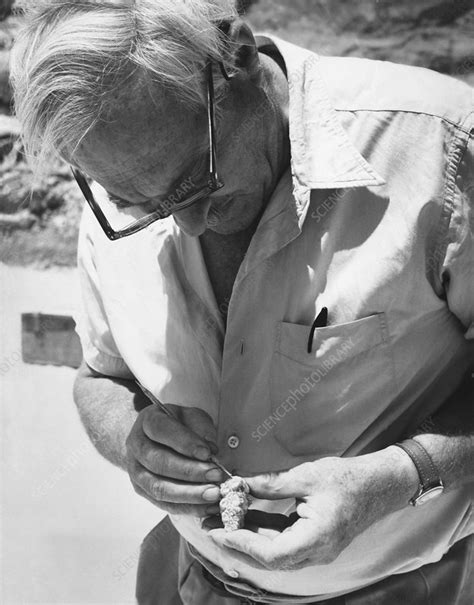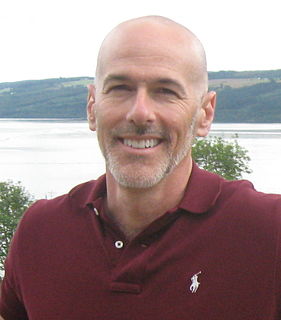Ein Zitat von Louise Leakey
Der Fossilienbestand zwingt uns dazu, über unseren Platz auf dem Planeten nachzudenken. Wir sind nur eine von mehreren Hominidenarten, die den Planeten Erde bewohnten, und wie unsere entfernten Verwandten, die erst vor kurzem ausgestorben sind, ist auch unsere Zeit auf dem Planeten Erde begrenzt.
Verwandte Zitate
Kein Planet ist erdähnlicher als die Erde selbst. Wenn also unter erdähnlichen Bedingungen wirklich leicht Leben entsteht, dann hätte es doch bestimmt viele Male genau hier auf unserem Heimatplaneten entstehen müssen? Und woher wissen wir, dass das nicht der Fall war? Die Wahrheit ist, dass niemand nachgeschaut hat.
Wir sind hier, weil im Laufe der Milliarden von Jahren unzählige Variablen entstanden sind, von denen jede einen anderen Weg hätte einschlagen können. Wir sind im Wesentlichen ein wunderschöner Zufall, ebenso wie die Millionen anderer Arten, mit denen wir diesen Planeten teilen. Unsere Zellen bestehen aus Atomen und Staubpartikeln aus fernen Galaxien und aus Milliarden lebender Organismen, die vor uns diesen Planeten bewohnten.
Die Gesundheit unseres Heimatplaneten und das Überleben unserer Spezies können nur durch die Nutzung der Weltraumressourcen und die Ausweitung des Wirtschaftsraums der Erde bis zum Mond und darüber hinaus gesichert werden. Die Schaffung einer außerirdischen Wirtschaft und einer Zivilisation auf mehreren Planeten wird die langfristigen Zukunftsaussichten der Menschheit sichern.
Menschen sind nicht unvermeidlich und unsere kurze Existenz ist nicht dazu bestimmt, sich in ferner Zukunft fortzusetzen. Wenn der Homo sapiens weiterhin auf der Erde präsent sein soll, wird die Menschheit ihr Gefühl für ihren Platz in der Welt neu bewerten und ihre streng auf die Art ausgerichtete Verwaltung des Planeten ändern. Unsere kollektiven Vorstellungen von Moral und Ethik haben einen direkten Einfluss auf das endgültige Schicksal unserer Spezies.
Unsere Bevölkerung und unsere Nutzung der endlichen Ressourcen des Planeten Erde wachsen exponentiell, ebenso wie unsere technische Fähigkeit, die Umwelt zum Guten oder Schlechten zu verändern. Aber unser genetischer Code trägt immer noch die egoistischen und aggressiven Instinkte in sich, die in der Vergangenheit überlebenswichtig waren. Es wird schwierig genug sein, eine Katastrophe in den nächsten hundert Jahren zu verhindern, geschweige denn in den nächsten tausend oder Millionen. Unsere einzige Chance, auf lange Sicht zu überleben, besteht nicht darin, auf dem Planeten Erde nach innen zu blicken, sondern darin, uns in den Weltraum auszubreiten.
Für mich ist der Schritt des Menschen, Verantwortung für die lebendige Erde zu übernehmen, lächerlich – die Rhetorik der Machtlosen. Der Planet kümmert sich um uns, nicht wir um ihn. Unser selbstgefälliger moralischer Imperativ, eine eigensinnige Erde zu führen oder unseren kranken Planeten zu heilen, ist ein Beweis für unsere immense Fähigkeit zur Selbsttäuschung. Vielmehr müssen wir uns vor uns selbst schützen.
Unser größter theoretischer Physiker, Stephen Hawking, erklärte kürzlich, dass die Menschen nicht mehr als hundert Jahre Zeit haben, um diesen Planeten zu verlassen, um das Überleben unserer Spezies zu sichern. Und wenn jemand wie er dies tut, dann nicht nur mit einem Verständnis der Wissenschaft, sondern auch unseres fragilen Platzes und unserer Möglichkeiten im Universum.
Meine Arbeit ähnelt für mich eher dem, was die amerikanischen Ureinwohner sagen: Wenn wir auf der Erde gehen, stellen wir unsere Füße immer sehr vorsichtig auf den Boden, weil wir wissen, dass die Gesichter unserer zukünftigen Generationen von unten zu uns aufschauen, und wir vergiss sie nie. Ich denke, als Kultur haben wir sie heute vergessen. Diese Arbeit soll uns helfen, uns an sie zu erinnern. Es ist für uns eine Möglichkeit, nicht nur einen Sinn in unserem individuellen Leben zu finden, sondern diesen Ansatz auch auf den ganzen Planeten auszuweiten. Denn wenn wir das nicht tun, werden wir keinen Planeten haben.
Soweit wir wissen, ist die Erde der einzige Planet, auf dem Leben möglich ist, und der einzige Planet, auf dem wir überleben können. Unser Körper und unser Geist werden dadurch geformt. Unsere Herzen schwingen damit mit. Es wird für den menschlichen Geist wenig Freude bereiten, wenn wir das natürliche Gefüge der Erde zerstören und nichts anderes tun können, als einkaufen zu gehen. Wenn wir uns die Welt in einem Jahrhundert vorstellen, wenn wir unseren Urenkeln in die Augen schauen und sehen, wie sie uns anlächeln, weil sie wissen, dass wir uns um sie gekümmert haben, lächeln wir auch!
Ich interessiere mich für alles, was mit unserem Planeten zu tun hat, in unserem Planeten, außerhalb unseres Planeten, dem Universum, den Universen, galaktisch, dimensional, unterirdisch. Das sind tiefgreifende Dinge, auf die sich jeder konzentrieren muss: Was ist Ihre Nische auf diesem Planeten? Warum sind wir hier? Warum gibt es Kakerlaken und Wasserwanzen und so weiter?
Unser Planet existiert erst seit viereinhalb Milliarden Jahren. Stellen wir uns einen Planeten vor, auf dem es Leben gibt, so wie es auf der Erde existiert und der sieben Milliarden Jahre alt ist. Nehmen wir an, dieser Planet hat Intelligenz entwickelt. Nun, diese Intelligenz wäre viel weiter fortgeschritten als das, was wir hier auf der Erde Intelligenz nennen. Seit wann gibt es Intelligenz auf der Erde, wie wir sie definieren?
Es wurde gesagt, dass niemand jemals wieder den Mond auf die gleiche Weise betrachten wird. Noch bedeutsamer kann man sagen, dass niemand die Erde jemals auf die gleiche Weise betrachten wird. Der Mensch musste sich von der Erde befreien, um sowohl ihren winzigen Platz im Sonnensystem als auch ihren unschätzbaren Wert als lebensfördernder Planet wahrzunehmen. Als Erdenmenschen haben wir vielleicht einen weiteren Schritt ins Erwachsensein gemacht. Wir können unseren Planeten Erde mit Distanz, mit Zärtlichkeit, mit etwas Scham und Mitleid, aber letztendlich auch mit Liebe betrachten.


































